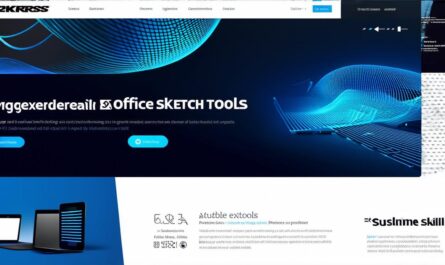Introduction:
The rise of automation in various industries has been on the rise for years now, and it is not surprising that digital marketing strategies are not immune to this trend. As AI and machine learning technologies continue to advance, more businesses are turning to automated tools and platforms to streamline their marketing efforts. However, the question remains: will automation impact digital marketing strategies positively or negatively? In this article, we’ll explore the potential benefits and drawbacks of using automation in digital marketing and examine how it may change the game for businesses.
Benefits of Automation in Digital Marketing:
One of the main benefits of automation in digital marketing is efficiency. With automated tools and platforms, businesses can save time and resources that would have been spent on manual tasks such as data analysis, social media management, and email campaigns. This allows marketers to focus on more strategic tasks and achieve better results in a shorter amount of time.
Another benefit of automation is the ability to personalize marketing messages to individual customers. By leveraging AI algorithms and machine learning models, businesses can analyze customer data and behavior patterns to create highly targeted and relevant campaigns that are tailored to each person’s needs and interests. This can lead to higher engagement rates, increased conversions, and greater customer satisfaction.
Automation can also help businesses improve the accuracy and effectiveness of their advertising efforts. With automation tools, businesses can use data-driven insights to optimize ad targeting, bidding, and budget allocation in real-time. This allows them to reach the right audience with the right message at the right time, which can lead to higher ROI and better overall performance.
Case Study: HubSpot’s Marketing Automation Tool
HubSpot is a leading marketing automation software that helps businesses streamline their marketing efforts and achieve better results. The company’s marketing automation tool allows businesses to create, manage, and optimize their marketing campaigns across various channels, including email, social media, and advertising. By leveraging data-driven insights and AI algorithms, HubSpot’s tool helps businesses improve the effectiveness of their marketing efforts and achieve better ROI.
According to HubSpot’s CEO, Brian Halligan, “Our marketing automation software is designed to help businesses achieve better results by making it easier for them to create, manage, and optimize their marketing campaigns. With our tool, businesses can save time and resources that would have been spent on manual tasks, while also achieving better engagement rates, higher conversions, and greater customer satisfaction.”
Drawbacks of Automation in Digital Marketing:
Despite its many benefits, automation in digital marketing is not without its drawbacks. One potential downside is the loss of human touch and personalization that comes with automated tools and platforms. By relying on algorithms and models to make decisions, businesses may miss out on the nuances and subtleties of human behavior that are so important for effective marketing.
Another potential drawback of automation is the risk of over-reliance on technology. While AI and machine learning can be incredibly powerful tools for improving marketing results, they are not a substitute for human expertise and intuition. Businesses that over-rely on automation may miss out on important insights and opportunities that only a human could identify.

Case Study: IBM’s Watson Marketing Campaign Management Tool
IBM’s Watson Marketing Campaign Management tool is another example of how automation can be used in digital marketing to streamline and optimize campaigns. However, like any tool, it comes with its own set of drawbacks. According to one customer who uses the tool, “While Watson’s algorithms can be incredibly powerful for improving campaign performance, I often find that they miss out on important nuances and subtleties of human behavior. This can lead to missed opportunities and lower engagement rates.”
Another potential downside of automation in digital marketing is the risk of security breaches and data privacy concerns. With more sensitive customer data being shared online, businesses must ensure that their automated tools and platforms are secure and compliant with relevant regulations. Failure to do so can result in serious legal and reputational consequences for a business.
How to Use Automation in Digital Marketing Effectively:
While the benefits of automation in digital marketing are clear, it’s important for businesses to use these tools effectively in order to achieve the best results. Here are some tips for using automation in digital marketing:
1. Define your goals and objectives before implementing any automated tools or platforms. This will help you identify which areas of your marketing strategy are most in need of automation, and ensure that you’re using these tools in a way that aligns with your overall business goals.
2. Use data-driven insights to inform your automation strategies. By analyzing customer behavior patterns and engagement rates across various channels, businesses can identify which automated tools and platforms are most effective for achieving their marketing objectives.
3. Monitor and optimize your automation efforts regularly. With automation tools, it’s easy to set up campaigns and then forget about them. However, regular monitoring and optimization can help businesses ensure that their automation strategies are still delivering the best results over time.
4. Keep a human touch in your marketing efforts. While automation can be incredibly powerful for improving efficiency and accuracy, it’s important not to lose sight of the importance of human connection and personalization in marketing. By combining automation with human expertise and intuition, businesses can achieve the best results.
Summary:
In conclusion, the rise of automation in digital marketing is a trend that shows no signs of slowing down anytime soon. While there are certainly potential drawbacks to using automation in this way, there are also many benefits that businesses can leverage to improve their marketing results and achieve better ROI. By defining clear goals and objectives, leveraging data-driven insights, monitoring and optimizing their efforts regularly, and keeping a human touch in their marketing



